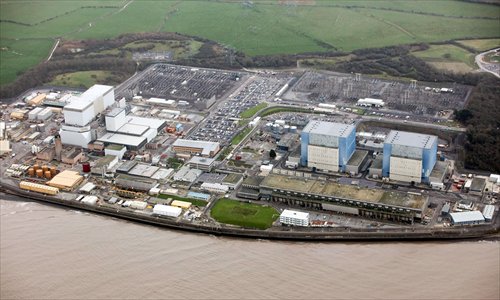Glowing future

Groundwork for the Hinkley Point C project near Bridgwater in Somerset, UK is shown next to the already-operating Point B. Photo: CFP

The opening session of the Fifth UK Civil Nuclear Showcase at Hotel Russell in London on January 19. Photo: Courtesy of WeShootLondon
Following the signing of an agreement on the Hinkley Point C project, the China and UK nuclear industries are growing closer.
China Guangdong Nuclear Power Group's (CGN) share in the project will be 33.5 percent under the Strategic Investment Agreement. It will be the first new nuclear plant in 20 years in Britain. The government claims to be able to provide reliable, affordable energy to nearly 6 million homes and create more than 25,000 jobs.
During Chinese President Xi Jinping's visit to Britain last October, China agreed to take a one-third stake in the Hinkley Point C project and to take shares in two further plants.
China is playing an increasingly important role in the international nuclear energy market. There is great potential for both countries to collaborate in the international nuclear energy market, according to Paul Drabwell, the head of Nuclear Team, BIS and UK Trade & Investment.
In line with the newly-signed agreement on the nuclear plant with Chinese partner, a "Chinese nuclear industry special session" was set up during the Fifth UK Civil Nuclear Showcase in London on the opening day last week.
The three-day exhibition from January 19-21 was jointly organized by the British government department UK Trade & Investment and the British Nuclear Industry Association and attended by the China National Nuclear Corp, CGN, the State Nuclear Power Technology Corp and China Nuclear Engineering and Construction Corp.
Mutually beneficial
China and Britain have a bright prospect in nuclear cooperation, Julianne Antrobus, the business development director in Nuclear Atkins, told the Global Times.
Antrobus said that the scale of China's investment in nuclear power plant is impressive, and there is no doubt that China will play an important role in the UK energy market, offering knowledge and expertise in supply chain, equipment.
Britain, on the other side, has strong decommissioning and waste disposal technology, engineering design capabilities and consulting experience, which is helpful for China. In addition, Britain is willing to team up with China to conduct business in other countries.
Worry about nuclear waste is a consistent problem. John Mason, managing director of ANTECH, a British nuclear measurement technology company, told the Global Times that the main focus of the nuclear power industry is placed on the construction of power plants and power generation capacity, while the disposal of nuclear waste is inadequate.
As with many countries, nuclear waste treatment in China is also problematic. "But China has opportunities to make appropriate measures while expanding its industry. China can learn lessons from the world especially countries which have more established nuclear power infrastructure, and do it better," Mason said.
Mason noted that, "ultimately we have to deal with the waste and decommissioning," arguing that dealing with the plant's end should be a priority from the start, and that the industry had failed to pay enough attention to the issue.
With a new generation of reactors planned, China is also thinking forward to the decommissioning of old nuclear facilities.
"There is no perfect solution for nuclear waste treatment," Mason said, adding that "We look upon the nuclear fuel as a waste product, but in the advanced reactors of the fourth generation, some of those waste products can in fact be used as fuel. So you need to identify them whether they are waste or potential fuel."
Widespread doubts
Since the agreement on Hinkley Point C was signed, there was strong opposition from the British media, energy experts and environmental activists. From opposite ends of the political spectrum, energy analyst Peter Atherton described the deal as "one of the worst ever signed by a British government," while green writer George Monbiot called it "a white elephant: overpriced overcomplicated, and overdue."
Julianne Antrobus told the Global Times, "There is no doubt that we need to work together to develop very robust stakeholder management plan, and build confidence on China's investment which is an endorsement by the UK government. "
Antrobus believes that the key messages should be very clear, arguing that it's important to convey the breadth and scale of the program that is already underway in China, and how the UK can benefit from it.
The UK government is committed to renewable energy, such as solar and wind power. But the current generating capacity is insufficient.
To make up the shortfall in electricity generation, a result of existing nuclear - and coal and gas - power stations shutting down, the government is looking to new nuclear plants. The journey to keep the nuclear option open started almost a decade ago with the UK's energy white paper in 2006.
The UK's stance on nuclear energy, as part of a mixed portfolio of energy going forward, is stable. The British government aims to achieve 16 gigawatt of nuclear electricity by 2020, according to Drabwell.
Drabwell told the Global Times, that as it's the first time for a Chinese company to participate in a UK nuclear energy project, Chinese enterprises need to understand the ways that the UK works, including the regulatory environment, public opinion and other issues, drawing on experience from their UK counterparts.
Drabwell also noted that Britain is willing to work with Chinese companies in the domestic UK market, and take this experience to other countries.